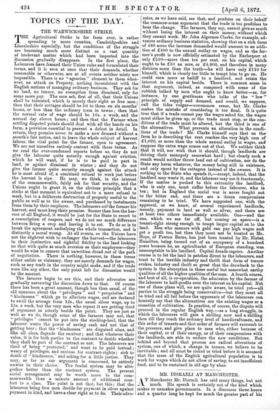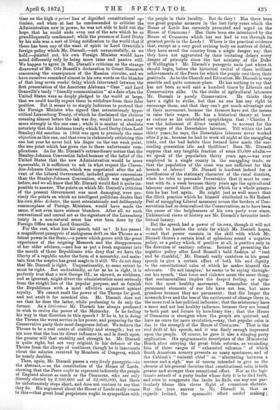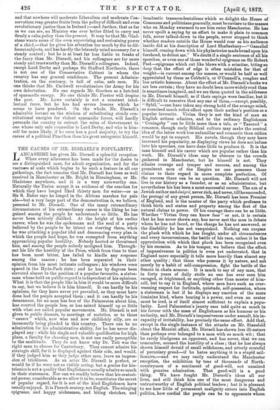MR. DISRAELI AT MANCHESTER.
AT Manchester Mr. Disraeli has said many things, but not much. His speech is certainly not of the kind which makes or unmakes governments. In a discourse three hours and a quarter long he kept for much the greater part of his time on the high a priori line of dignified constitutional op- the people in their locality. But do they ? Has there been timism, and when at last he condescended to criticise the Administration now in power, he was not able to hold out the hope that he could undo even one of the acts which he so grandiloquently condemned; while the presence of Lord Derby by his side was a sort of living notification to the world that if there has been any of the want of spirit in Lord Granville's foreign policy which Mr. Disraeli,—not unsuccessfully, as we hold,—pointed out, his own Foreign Minister would have acted differently only by being more tame and passive still. We happen to agree in Mr. Disraeli's criticism on the strange disavowal of Mr. Odo Russell's declaration to Count Bismarck concerning the consequence of the Russian circular, and we have ourselves remarked almost in his own words on the blunder of that long seven weeks' delay which intervened between the first presentation of the American Alabama " Case " and Lord Granville's tardy "friendly communication" at a date when the United States were so deeply pledged to the world at large, that we could hardly expect them to withdraw from their false position. But it seems to us simply ludicrous to pretend that the Foreign Minister who signed that ostentatiously hypo- critical Luxemburg Treaty, of which he disclaimed the obvious meaning almost before the ink was dry, would have acted any more strongly in the one case ; while it is matter of absolute notoriety that the Alabama treaty which Lord Derby (then Lord Stanley) did sanction in 1868 was open to precisely the same objection as this one, and that even in elaborately criticising this one last year he never laid his finger on the one weak point, the one point which has given rise to these unfortunate com- plications. As for Mr. Disraeli's extraordinary notion that the Stanley-Johnson Convention failed because of the belief of the United States that the new Administration would be more squeezable, it is sufficient to ask in what respect the Claren- don-Johnson Convention, which was negotiated after the ad- vent of the Liberal Government, included greater concessions than the Stanley-Johnson Convention, which was negotiated before, and we all know that Mr. Disraeli would find it quite im- possible to answer. The points on which Mr. Disraeli's criticism of the present Government was most damaging, were pre- cisely the points on which no intelligent politician doubts that his own fidus Achateq, the most ostentatiously and deliberately commonplace of Foreign Ministers, would have made' the same, if not even more serious blunders. After all, no such conventional and unreal act as the signature of the Luxemberg treaty in a non-natural sense has ever been done by the Foreign Office under Lord Granville.
For the rest, what has his speech told us It has passed a magnificent panegyric of ambiguous drift on the Throne as a latent power in the State,—a power which grows with the great experience of the reigning Monarch and the disappearance of her older advisers, —and has so put a fresh argument into the mouth of those Republicans who deny that we have the liberty of a republic under the form of a monarchy, and main- tain that the sceptre has great magic in it still. We do not deny that Mr. Disraeli is right. Unquestionably, to some extent he must be right. But undoubtedly, so far as he is right, it is perfectly true that a new George III., as shrewd, as stubborn, and as ignorant, might divert the administration most seriously from the stright line of the popular purpose, and so furnish the Republicans with a most effective argument against royalty. We cannot exalt the power of the Throne for good, and not exalt it for mischief also. Mr. Disraeli does not
see that he does the latter, while professing to do only the former. As a litterateur Mr. Disraeli has always professed
to wish to revive the power of the Monarchy. Is he feeling
his way in that direction in this speech ? If he is, he is doing the Throne the worst service in his power, and preparing for the Conservative party their most dangerous defeat. We believe the Throne to be a real centre of stability and strength ; but we
are sure that the less its direct influence is, and is dwelt upon, the greater will that stability and strength be. Mr. Disraeli is quite right, but not very original, in his defence of the Throne from the charge of costliness, though he is inaccurate about the salaries received by Members of Congress, which he nearly doubles.
Then, again, Mr. Disraeli passes a very lively panegyric—in the abstract,.on the constitution of the House of Lords,
showing that the Peers ought to represent indirectly the people
of England almost as much as the Commons, who are only directly elected by 2,300,000 out of 32,000,000, but there he unfortunately stops short, and does not venture to say that they do. His argument about the House of Lords really comes to this—that great local proprietors ought to sympathise with
time on the high a priori line of dignified constitutional op- the people in their locality. But do they ? Has there been
one great popular measure in the last forty years which the House of Lords has earnestly promoted and urged on the House of Commons? Has there been one introduced by the House of Commons which has not had to run through its greatest perils in the Lords ? Where is the practical evidence that, except as a very good revising body on matters of detail, they have saved the country from a single danger, nay, that they have not aggravated by their irritating delays every danger of principle since the last ministry of the Duke of Wellington ? Mr. Disraeli's panegyric ends just where it should begin, before the historical recital of those brilliant achievements of the Peers for which the people owe them their gratitude. As to the Church and Education, Mr. Disraeli is very sensible and quite common-place. He has nothing to say that has not been as well said a hundred times by Liberals and Conservatives alike. On the strike of agricultural labourers Mr. Disraeli is purely Conservative. He thinks they have a right to strike, but that no one has any right to encourage them, and that they can't get much advantage out of their movement, because the farmers have not the means to raise their wages. He has a historical theory at least as curious as his celebrated apophthegm that "Charles I. was the holocaust of direct taxation," to account for the low wages of the Dorsetshire labourer. Till within the last thirty years, he says, the Dorsetshire labourer never worked after 3 p.m., because he had to work all night at the smuggling trade, and the bad habits thus formed have made the suc- ceeding generation idle and thriftless ! Does Mr. Disraeli suppose that any tangible fraction of some 25,000 adults,— we speak of the population thirty years ago,—was ever employed in a single county in the smuggling trade, or that the population of the coast was not sufficient for this branch of labour? Mr. Disraeli is hard-set indeed for a justification of the stationary character of the rural districts, when be tries to persuade Dorsetshire that it must be con- tent with 8s. a week because thirty years ago the agricultural labourer earned those illicit gains which for a whole genera- tion he has lost again. He might just as well assert that the illicit practice which he himself attributed to Sir Robert Peel of smuggling Liberal measures across the borders of Con- servatism had so demoralized the Conservatives, as to have been, the cause of the helplessness of his own party ever since. Unhistorical views of history are Mr. Disraeli's favourite intel- lectual luxury.
But the speech had a power of its own, though it will not do much to hasten the crisis for which Mr. Disraeli hopes,. —and that power consists in the skill with which Mr. Disraeli throws a certain kind of splendour round a negative policy, or a policy which, if positive at all, is positive only in the direction of sanitary reform. Instead of presenting the negative policy after Lord Russell's bald fashion of "rest and be thankful," Mr. Disraeli really contrives in his great speech to give a certain effect of both life and dignity to the constitutional calm of which he makes himself the advocate. Do not imagine,' he seems to be saying through- out his speech, that force and violence mean the same thing, that sentimentalism implies the deepest feeling, or agita- tion the most healthy movement. Remember that the permanent elements of our life have not less, but more grandeur because they are permanent ; that the longer the monarch lives and the less of the excitement of change there is, the more real is her political influence; that the aristocracy have a more and not less healthy influence, because they are bound to both past and future by hereditary ties ; that the House of Commons is strongest when the people are quietest and have no crave for more revolution,—nay, that popular calm is due to the strength of the House of Commons.' That is the real drift of his speech, and it was finely enough impressed upon the people. Of course, he gave it also a stinging party application. His epigrammatic description of the Ministerial Bench after carrying the great Irish reforms, as reminding him of those ranges of " exhausted volcanos " of which South American scenery presents so many specimens, and of the Cabinet's "eminent chief" as "alternating between a menace and a sigh," was of course intended to give us the obverse of his general doctrine that constitutional calm is both greater and stronger than sensational effort. Nor as the legi- timate assault of a party leader whose duty it is to find fault,
and even to exaggerate the faults he finds, can any one par- ticularly blame this clever flight of censorious rhetoric. But the true answer to Mr. Disraeli is, that as regards Ireland, the spasmodic effort needed making ;
and that nowhere will moderate Liberalism and moderate Con- servatism reap greater fruits from the policy of difficult and even revolutionary justice than in Ireland ;—and. further, that as far as we can see, no Ministry was ever better fitted to carry out firmly a calm policy than the present. It may be that Mr. Glad- stone wants some of the even supervising and restraining power of a chief,—that he gives his attention too much by fits to dif- ferent subjects, and has hardly the leisurely mind necessary for a steady control ; but he is at least far less liable to freaks of the fancy than Mr. Disraeli, and his colleagues are far more steady and trustworthy than Mr. Disraeli's colleagues. Indeed, except Lord Derby and perhaps Sir Stafford Northcote, there is not one of the Conservative Cabinet in whom the country has any general confidence. The present Adminis- tration, on the contrary, is full of calm, safe men. No one thinks that Mr. Cardwell revolutionizes the Army for his own delectation. No one regards Mr. Goschen as a hot-bed of spasmodic energy. No one thinks Mr. Forster will despise the past. Mr. Lowe certainly is not a constant intel- legtual force, but he has had severe lessons which he seems to have pondered. On the whole, Mr. Disraeli's admirable lecture on the wisdom of substituting steady con- stitutional energies for violent spasmodic forces, will hardly persuade the country to entrust the reins of Government to one whose only safe counsellor is Lord Derby, and who is him- self far more likely, if he once has a good majority, to try the -career of a political Phaethon than his great antagonist himself.




































 Previous page
Previous page